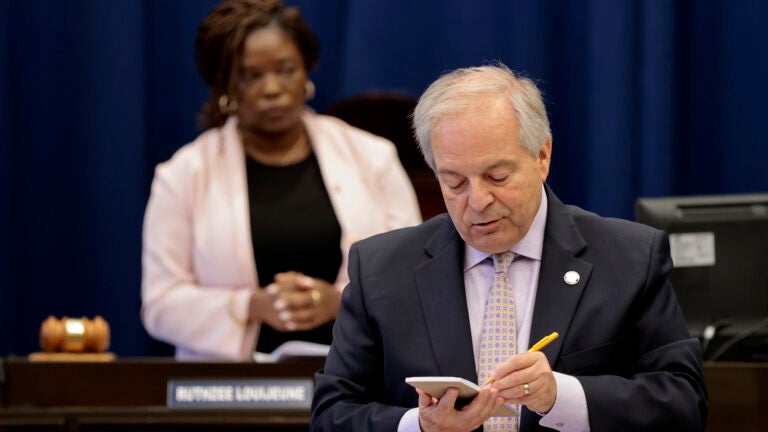
Local News
Councilors worked late into the night Wednesday, passing only a few amended budget items against Wu’s budget.

City Clerk Alex Geourntas tallies the Boston City Council’s vote on Mayor Michelle Wu’s property-tax policy earlier this month. Council president Ruthzee Louijeune is at left. Photo by Pat Greenhouse/Globe Staff
On Wednesday, the Boston City Council failed to override Boston Mayor Michelle Wu’s veto of the $15.3 million line item changes they made to her $4.6 billion spending plan for the city.
Wu’s most notable criticism of the changes was the $3.7 million in cuts to the police and fire department budgets, which would instead go towards housing assistance, college and career readiness, and small business programs.
Even though the Council voted for the line item changes earlier this month in a 10-3 vote, the final vote was 7-6 for overriding Wu, missing the supermajority needed for passage by two votes.
Wu introduced her proposed budget for fiscal year 2025 in April. Councilors had been formulating amendments to it during more than 30 hearings and working sessions. Under the council’s amendments, the city’s central departments, including those focused on public safety, would still see increased budgets.
Wu has the power to approve or deny the changes made by councilors, which she exercised earlier this month.
The City Council can override the mayor’s vetoes with a two-thirds majority vote.
“I think it’s important to remember who we are fighting for,” said City Councilor Julia Mejia before the vote of the complete override. “I am serious about being a body that is not a rubber stamp to this administration and that we will rise up and say we want it all and deliver what we’ve been asked to do.”
The City Council failed to pass the overall $15.3 million line item changes, which included $1 million for housing vouchers that would help 66 families remain in their homes, $1.1 million in down payment assistance, $740,000 for youth jobs, $500,000 for the right to counsel, $500,000 for college readiness programs, and another $500,000 for support services for communities and families of murder victims.
The package did not include reallocations from the police, fire, inspectional services, or parks and recreation departments.
The line items that saw changes made up less than 0.3% of the budget.
City Councilors Sharon Durkan, John Fitzgerald, Ed Flynn, Erin Murphy, Enrique Pepen, and Henry Santana voted against the measure.
The failure moved the Council to separate the line items and vote on them separately, a lengthy process that continued late into the night after multiple failed attempts to reconfigure what City Councilors would approve.
What was changed in the budget:
The Councilors unanimously approved a $2.45 million package, including $1 million for updating the police crime lab, which will purchase new equipment for sexual assault test kits, $500,000 for the Family Justice Center, and $200,000 for rodent and pest control. The package also included $500,000 to bridge “digital equity” and $65,000 to hire a full-time building inspector.
“We should be embarrassed in Boston that we don’t have a state-of-the-art crime lab,” said Councilor Flynn, who added that the department is not meeting deadlines to test sexual assault kits.
In a 10-3 vote, the Council approved moving $2.15 million to workforce development, youth homework help, housing vouchers, youth employment, the Finance Commission, college readiness programs, and BCYF toddler play and programming.
The Council also unanimously approved $500,000 of reallocation to a program to help families going through eviction obtain counsel.
A $1.8 million package that included delaying the police promotional exam for a year missed the necessary supermajority with an 8-4 vote.
Councilor Benjamin Weber said the test has proven ineffective in helping officers of color secure promotions within the department. Even though 40 percent of patrol officers are people of color, fewer than 10 percent of officers are, he said.
Weber said delaying the exam would “help give them a fair shake in our police department” and give the Council a chance to “have our voices heard.”
However, the Council overwhelmingly supported a half-a-million reallocation from Execution of Court (which helps pay lawsuits and settlements for the city) towards programs that provide trauma support to families and communities that have had someone die by gun violence.
A few council members shared personal stories about lossing someone in the city due to gun violence and the importance of the programs led by the Louis B Brown Peace Institution.
After one family failed to get enough money to do a proper Muslim burial, City Councilor Tania Fernades Anderson said she felt like her hands were tied when the city had no funds to help.
“All of us have a story or can connect to the story,” Anderson said before the vote. “It is absolutely despicable to stand by and not support programs like that.”
The Council failed to pass a reallocation of $50,000 from the Office of Intergovernmental Relations to raise salaries for council staff, in an 8-5 vote.
“We as a city council are very limited to do anything with money,” said City Council President Ruthzee Louijeune before the vote. “This is our avenue.”
She said this was the chance for the chamber to “stand up for our staff and be there and say we are fighting for them.”
The Council also passed $100,000 in reallocating money from the transportation department to fund a Black male equity study.
The Council voted to pass an additional $100,000 to support English as a Second Language programs for adults in the city. The funding will help expand capacity to five to six classes and help 250 immigrant parents.
Councilor Gabriela Coletta Zapata noted there are wait lists throughout the city for adults to enter these programs as they hope to gain jobs and improve their communication skills.
“It is a way to unlock another level of economic levels for folks,” Zapata said.
Newsletter Signup
Stay up to date on all the latest news from Boston.com





